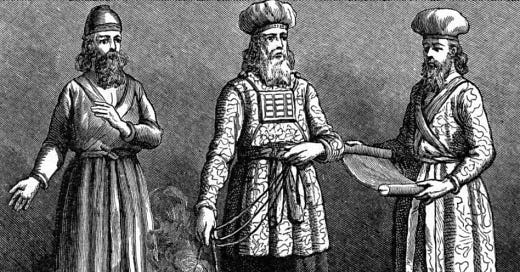For which reason, devoted siblings, associates in a heavenly calling, ponder our open agreement’s Commissioner and Senior Priest, Yēsous… Hebrews 3:1
Today, we’re starting with the passage because I just love this line: associates in a heavenly calling. Today we’re going to talk about what this means, highlight an implication of it, and that will wrap it up for the day!
Collaborators with Jesus
So, to start, this word “associates” is sometimes translated “partakers” (like in the NASB) and “partners” (like in the NRSV). It’s a word mainly used by the Hebrews writer, but it does show up once in Luke to describe the disciples and their fellow fishermen (Luke 5:7).
The idea behind this word is '“not in the banal sense of business partners or fellows.”1 If we combine the ideas of “partaking” and “partnership” then I think we’ll capture the idea. In other words, our partnership and allegiance to Christ means that we are participating in the divine life. Peter said,
Thus he has given us, through these things, his precious and very great promises, so that through them you may escape from the corruption that is in the world because of lust and may become participants of the divine nature. 2 Peter 1:4, NRSV
So we are participants in the divine nature, and this participation leads to collaboration. That is, having been reconciled, we become ministers of reconciliation:
All this is from God, who reconciled us to himself through Christ and has given us the ministry of reconciliation; 2 Corinthians 5:18
And what word might we use to describe this new participation/ partnership we have in Christ?
Well, we might use the word “priests!”
Jesus, as this verse teaches, functions as the high priest, and we participate as a holy priesthood since we are both partakers and collaborators in this heavenly calling (1 Peter 2:5, 9).
Yes, Even You Can Be a Priest
With the talk of priests, we have to address something a bit obvious that the Hebrews writer also pointed out. It’s a bit of a flaw in our claim to priesthood:
Now the one of whom these things are spoken belonged to another tribe, from which no one has ever served at the altar. For it is evident that our Lord was descended from Judah, and in connection with that tribe Moses said nothing about priests. Hebrews 7:13–14
In other words, in the First Covenant, there were limitations on who could be a priest, though that was not the original intention of God (Exodus 19:6). To be a priest in the temple or tabernacle you had to be an Israelite, a descendant of Levi, and male. Those born of the tribe of Levi served in the tabernacle, but Aaron’s sons took on the role of what we think of as priests, basically controlling temple worship.2
Which means you could not have been a priest.
But now you can.
Gentile? You can be a priest.
Not of the tribe of Levi? You can be a priest.
Female? You can be a priest.
All of us our siblings in Christ, so all of us our priests and partakers/ partners in this divine calling, and what do priests do? We offer up worship to God within the Holy Place.
To limit a woman’s role in the public worship of the church simply because she is a woman, then, is to limit the limitless priesthood of all believers.
I know that not everyone is comfortable with this because of how they were taught to read the Bible, specifically just two passages, but the New Testament embraces the place of women in the church far more than it allegedly denounces it.
The Holy Spirit has been poured out on sons as well as daughters, menservants as well as maidservants. Paul told the Thessalonians to not “quench the Spirit.” Is this not what we have done by restricting the role of women in the Christian community?
Priscilla, who is mentioned first, along with her husband Aquila taught Apollos the Way of God more accurately. Phoebe delivered, and possibly explained, the letter to the Romans since she served as a deacon. And let’s not forget Junia, whose name is often masculinized, who wasn’t just out there standing among the apostles, but who was outstanding or prominent among the apostles (apostles is used here in the general sense such as with Barnabas and Epaphroditus).
We could go on and list prominent co-laborers with Paul as well as others who receive notable mention within scripture, but this will suffice for now. I know it is uncomfortable for many of my dear siblings in Christ, but it is long past time for women to take their place beside men within their congregations in functioning as priests. Thus far, they have been given the role of Levites, cleaning and tending to the maintenance of the “tabernacle” and not the full responsibility that all sons and daughters of God have.
Attridge, Harold W., and Helmut Koester. The Epistle to the Hebrews: A Commentary on the Epistle to the Hebrews. Philadelphia: Fortress Press, 1989. Print. Hermeneia—a Critical and Historical Commentary on the Bible.
Aaronic priests, who were descended directly from the line of Aaron and essentially controlled temple worship
Meeks, Charles. “Priesthood.” Ed. John D. Barry et al. The Lexham Bible Dictionary 2016: n. pag. Print.




